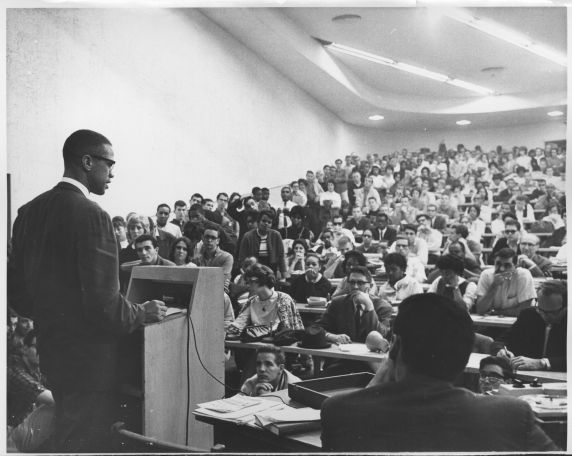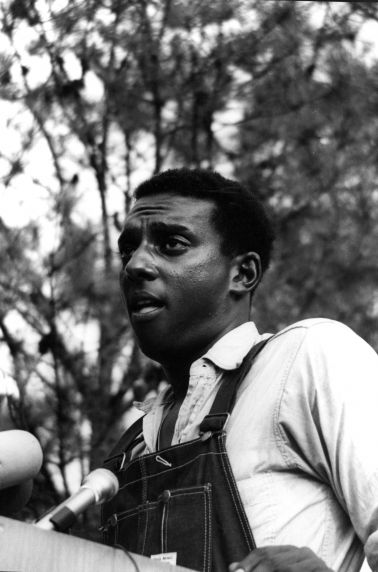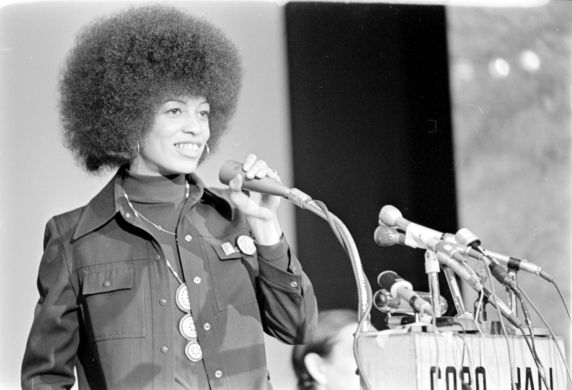Subject Focus: Black Revolutionaries
- African Americans
- African Americans--Michigan--Detroit--History--20th century
- African Americans--Michigan--Detroit--History--Pictorial works
- African Americans--Michigan--Detroit--Social conditions--20th century
- Black militant organizations
- Black nationalism--United States
- Black Panther Party
- Black power--Michigan--Detroit
- Black Workers Congress
- Detroit (Mich.) Police Dept.
- Detroit--economic conditions
- Detroit--politics and government
- Detroit--race relations
- Detroit--social conditions
- Dodge Revolutionary Union Movement
- Radicalism
- Republic of New Africa (Organization)
- Student Nonviolent Coordinating Committee (U.S.)
- X, Malcolm, 1925-1965
The Reuther Library celebrates African American History Month with a brief look at resources in our collections that deal with the topic of Black revolutionaries. We define Black revolutionaries as persons or groups whose goal was to create a positive change in the lives of African Americans through radical action. The means to this end varied from person to person, organization to organization - the action could be carried out with words or through armed conflict, the desired results could be equality for all or separation of races all together. The following resources chronicle the struggle for identity and equality and highlight the rich legacy of social and political activism and reform within the various revolutionary movements.
The Dan Georgakas Papers are a good place to start when contemplating the topic of Black revolutionaries. The papers contain research material collected for Georgakas’ book Detroit, I Do Mind Dying: A Study in Urban Revolution and document the activities of Black radical groups in Detroit in the 1960s and 1970s. Topics include the Black Worker’s Congress, Kenneth Cockrel, James Johnson, and the League of Revolutionary Black Workers.
Closely related to the Georgakas Papers are the papers of the Detroit Revolutionary Movements. The collection has multiple parts, including the papers of the Dodge Revolutionary Union Movement (DRUM), an independent Black radical workers' organization formed in the Chrysler Corporation’s Dodge Main plant in Hamtramck, MI and the League of Revolutionary Black Workers, a collective of Revolutionary Union Movements. Please note: This heavily used collection is available for use through microfilm only for preservation purposes.
On the political front, formed in 1963 by the members of the Black Nationalist group UHURU, the Michigan Freedom Now Party was an attempt to mobilize black voters and create an independent black political movement. The papers of George Weissman and Ernest Smith both contain information on this short-lived, influential party. In addition, audiovisual material, including recordings from meetings and campaign signs, can be found within the collection of Detroit activists James and Grace Lee Boggs.
Stokely Carmichael (later Kwame Ture), addresses participants in the “Meredith March Against Fear" at its conclusion on the grounds of the Mississippi State Capitol, Jackson, Mississippi.
The papers of Tom and Janet Canterbury contain information on the Student Nonviolent Coordinating Committee (SNCC), the civil rights organization that famously adopted Black Power as its guiding philosophy in the late 1960s. Images from the SNCC-sponsored and its leaders Stokely Carmichael (later Kwame Ture) and H. Rap Brown (later Jamil Abdullah Al-Amin) can be found within the Social Forces, Foundations and Change Image Gallery. Additional collections that deal with Black Power include the Francis D. and G. Lyman Paine Papers and the Norman McRae Papers.
One of the largest and most influential players in the struggle for Black identity and equality in the late 1960s and early 1970s was the separatist social movement organisation Republic of New Afrika (RNA). Founded in Detroit in 1968 and led by the charismatic brothers Gaidi Abiodun Obadele (Milton R. Henry) and Imari Abubakari Obadele (Richard Henry), the RNA sought to free Black people in the United States from oppression; to promote the personal dignity and integrity of the individual and to protect his natural rights; and to support co-operative economics and community self-sufficiency. In addition, the RNA demanded the creation of an independent Black-majority country for African Americans in the South, reparation payments made by the government to African Americans as redress for the injustices heaped upon their people during years of slavery and segregation, and a referendum of all African Americans so that they might decide their citizenship status. The argument for the latter being that as the descendants of slaves, they had had no choice in becoming Americans.
For more information on the RNA, the papers of Chris and Marti Alston serve as a good starting point. Audio recordings concerning the activities of the RNA are found within the collection of Martin and Jessie Glaberman. Material on the New Bethel Baptist Church incident, a shoot-out between members of the RNA and Detroit Police officers, can be found in the Kenneth and Sheila Cockrel Papers. Cockrel, a lawyer, activist, Detroit city-councilman and founding member of the League of Revolutionary Black Workers, successfully defended members of the RNA accused of shooting two policemen. Additional information on the New Bethel Baptist Church incident can be found in the George Crockett Papers.
Two secondary resources of particular interest to anyone looking at issues involving Black revolutionaries in the late 1960s are the Inner City Voice and The South End. From 1968–1969, under the editorship of John Watson, Wayne State University’s student newspaper The South End served as a mouthpiece of “the de facto united radical front." Watson, a member of the Detroit Black Panthers and the League of Revolutionary Black Workers, led the paper "with the intention of promoting the interests of impoverished, oppressed, exploited, and powerless victims of white, racist monopoly capitalism and imperialism." The Inner City Voice served as an independent mouthpiece with a decidedly Marxist perspective for issues concerning Detroit’s Black community, including working conditions, education, housing inequality and welfare programs. The Inner City Voice can be found within the Detroit Revolutionary Movements Papers. An additional resource is the Mike Hamlin and Joann Castle Papers which feature materials collected by Hamlin, a founding member of the League of Revolutionary Black Workers who worked on both papers.
No examination of Black revolutionaries can be complete without a mention of the Black Panther Party for Self-Defense (BPPSD), commonly referred to as the Black Panthers. Information on the BPPSD can be found in the Mike Hamlin and Joann Castle Papers. The Ernest Goodman Papers contain material related to Mr. Goodman’s activities as defense counsel for fifteen members of the BPPSD charged with murder and conspiracy to murder of a Detroit Police officer. The Detroit News Collection has numerous original photonegatives from this conflict, as well images of the local branch headquarters and its leaders, all of which can be found in the Social Forces, Foundations and Change Image Gallery. In addition, our Library Collection has holdings from The Black Panther, the official publication of the organization, from the years 1968-1972. Finally, the Martin and Jessie Glaberman Collection has audio recordings concerning the group’s activities and the Audiovisual Department has footage of a shootout between the BPPSD and Ann Arbor Police within its general video holdings.
Images of other notable individuals and organizations, such as Angela Davis, Jaramogi Abebe Agyeman, Malcolm X, Jamil Abdullah Al-Amin (H. Rap Brown), Gaidi Abiodun Obadele (Milton R. Henry), Imari Abubakari Obadele (Richard Henry), Robert F. Williams, and the Nation of Islam (NOI) are available through the Detroit News Collection and be found in the Social Forces, Foundations and Change Image Gallery.
For more information on collections related to African American history, see Subject Focus: African American History at the Reuther Library. For information on additional resources concerning Black revolutionaries, please contact our reference archivist.
Please note: Audiovisual resources (audio recordings, moving images, photographs) are available for research by appointment only.
Elizabeth Clemens is an Audiovisual Archivist for the Walter P. Reuther Library.
- eclemens's blog
- Login to post comments
- Printer-friendly version




 Reddit
Reddit Facebook
Facebook LinkedIn
LinkedIn